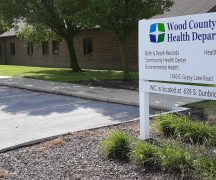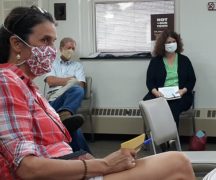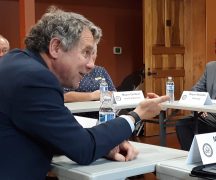By JAN LARSON McLAUGHLIN
BG Independent News
For years, senior citizens have had a day dedicated to them at the Wood County Fair. But this year – if the fair goes on – since older adults are the most vulnerable to COVID-19, the Wood County Committee on Aging will not be promoting Senior Day.
“I’m really concerned about hosting senior day at the fair,” Denise Niese, executive director of the Wood County Committee on Aging, said Wednesday during a meeting of the WCCOA board.
“We as an agency have to be careful” of promoting unsafe opportunities to seniors, she said.
The board suggested the fair board be approached about offering “senior mornings” rather than one day – so older adults can get in free when the fair is less crowded, and can spread out visits throughout the week.
Wood County Health Commissioner Ben Batey, who is also a WCCOA board member, cautioned about gathering seniors for the usual entertainment at the fair.
“Bringing large groups under big tents together” would not be wise, he said.
The fair board has discussed the possibility of not having rides this year due to the coronavirus, Batey said. That could mean there would be more space for people to spread out at the fair, he said.
Several board members expressed concern about seniors attending large events like the county fair.
“We’re talking about the most vulnerable group,” Nancy Orel said.
“I have no desire to be a canary,” Paul Herringshaw said.
“We might be sending mixed signals to some that we think it is safe,” Becky Bhaer said.
Niese agreed that the WCCOA should be a responsible voice for seniors.
“Can we create an environment that makes it as safe for people as possible?” Orel asked.
Batey said the public needs to realize the risks posed for seniors.
“We want people to recognize seniors are the at-risk group,” he said, noting that the 49 deaths from COVID-19 in Wood County have all been people aged 60 and older.
“Can we carve out safe spaces for those most at risk?” Batey asked.
Batey reported that initially the state had set tight standards on precautions required for fairs this summer. However, those requirements were walked back this week, he said.
“It pretty broadly opens up the capacity for these fair events,” he said. It will be public health’s job to get the message out to at-risk categories of people.
“We have to be honest with the public what those risks are,” Batey said.
The level of risk for August won’t be known until it gets closer and the number of local COVID cases are examined, he added.
“My hope is that the numbers stay low for the summer,” Batey said.
The WCCOA board also discussed services offered to area seniors during the pandemic. All the senior centers in the county are closed, but home-delivered meals and some services are still being offered remotely.
When senior centers are able to open, Niese said all who enter facilities should be required to wear masks covering their mouths and noses. The board approved that policy, which will remain in place until a vaccine for COVID-19 is available.
“We have to acknowledge the vulnerability of our participants,” Niese said.
“We want our residents to feel safe when they come to our centers,” Batey said.
In Ohio, many business employees are required to wear masks, but each individual business can set its own standards for customers. However, due to the vulnerability of the senior population, the board approved the mask requirement for all who enter senior centers.





